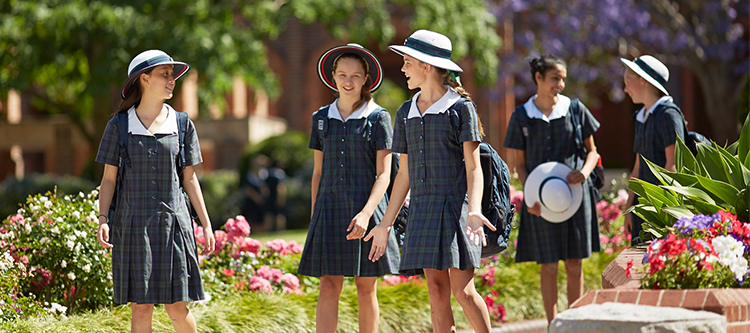How to encourage healthy friendships
Thursday 13 October, 2016
 Close your eyes next time you’re at Pymble, and you’ll hear what friendship sounds like.
Close your eyes next time you’re at Pymble, and you’ll hear what friendship sounds like.
It’s belly laughs and squeals of joy, and focused conversations and easy affection. Depending on the ages of the girls, friendship is also rule-making, story-sharing, negotiating, contented silence and, sometimes, raised voices or stony silences.
Friendship – where enjoyment, respect and support for each other live – is a strong focus for us at Pymble. It’s where a lifetime of empathy, self-respect and positive relationships can be experienced and embedded.
Friendships are also important because they provide a sense of belonging and encourage confidence in ways that parents cannot. As your daughter matures, friends share support and information about the emotional and physical changes she will experience. Friends allow your daughter to explore her identity: what she values, what she likes and dislikes, and the character traits she wishes to embody.
Just as importantly, it’s through friendship that we first learn how to resolve conflict well. Conflicts do and should occur in schools – this is a natural part of developing social maturity. Learning to resolve these conflicts with kindness and wisdom is part of healthy friendships.
Through our daily Connect groups, we provide support for girls as they develop the skills to have and be good friends. We encourage them to expect standards of respect and kindness of themselves and others.
Every girl is different and develops her social maturity at a different rate. At every age and stage, we, as parents and educators, can encourage our girls to enjoy healthy friendships.
Preparatory and Junior School girls
The youngest girls in our school base their friendships on the moment, such as who shares their interests or plays with them at breaks and after school. As they grow, it’s natural for them to develop quite complex rules of inclusion or exclusion, and this is a time when it’s easy for feelings to get hurt.
Here are some tips for encouraging healthy friendships in these ages:
- If your daughter is feeling excluded (for example, someone does not want to play with her) reassure her there are still many people who love her.
- Talk to her about forgiveness, and teach her it’s okay to let things go.
- Model what good friendships look like. When you are with your friends, show that you have fun, share problems, and apologise and forgive when necessary.
- Manage expectations that everyone has to be her friend. While it’s important to respect one another, it’s not possible to be friends with everyone.
- Organise her close friends to come over and play. This shows you value her friendships while supervising and supporting.
Middle, Upper and Senior School girls
As girls mature, their view of friendship broadens and deepens. While they value a few close friends with whom they can share confidences, they grow to accept they can maintain a wide range of friendships of different intensities.
To connect with your older daughter and support her friendships:
- Provide opportunities for your daughter to open up about problems she is facing. Instead of a sit-down conversation that can be confronting, go for a walk or drive.
- Listen without judgement. While it’s tempting to unload your wisdom, it’s more empowering to ask questions in a way that will allow your daughter to discover the answer herself.
- Avoid getting personally involved in disputes. While you might see this as an act of love, it can unnecessarily escalate matters.
- Monitor your daughter’s use of social media and other technology. For more on this, this Digital Disruption blog.
There is no question that developing friendships is a lifelong skill and, at times, the road can get bumpy. If you’re concerned about your daughter’s friendships, please don’t hesitate to contact her Connect teacher and ask for a meeting.


